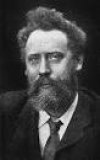Analysis of What Is To Come
William Ernest Henley 1849 (Gloucester) – 1903 (Woking)
What is to come we know not. But we know
That what has been was good--was good to show,
Better to hide, and best of all to bear.
We are the masters of the days that were:
We have lived, we have loved, we have suffered . . . even so.
Shall we not take the ebb who had the flow?
Life was our friend. Now, if it be our foe -
Dear, though it spoil and break us!--need we care
What is to come?
Let the great winds their worst and wildest blow,
Or the gold weather round us mellow slow:
We have fulfilled ourselves, and we can dare
And we can conquer, though we may not share
In the rich quiet of the afterglow
What is to come.
| Scheme | aabxa aabC aabbaC |
|---|---|
| Poetic Form | |
| Metre | 1111111111 1111111111 1011011111 1101010110 1111111110101 1111011101 111011111101 1111011111 1111 1011110101 1011011101 11010010111 0111011111 001101010 1111 |
| Closest metre | Iambic pentameter |
| Characters | 615 |
| Words | 130 |
| Sentences | 12 |
| Stanzas | 3 |
| Stanza Lengths | 5, 4, 6 |
| Lines Amount | 15 |
| Letters per line (avg) | 31 |
| Words per line (avg) | 9 |
| Letters per stanza (avg) | 155 |
| Words per stanza (avg) | 43 |
Font size:
Submitted on May 13, 2011
Modified on March 09, 2023
- 39 sec read
- 92 Views
Citation
Use the citation below to add this poem analysis to your bibliography:
Style:MLAChicagoAPA
"What Is To Come" Poetry.com. STANDS4 LLC, 2024. Web. 27 Apr. 2024. <https://www.poetry.com/poem-analysis/40586/what-is-to-come>.


Discuss this William Ernest Henley poem analysis with the community:
Report Comment
We're doing our best to make sure our content is useful, accurate and safe.
If by any chance you spot an inappropriate comment while navigating through our website please use this form to let us know, and we'll take care of it shortly.
Attachment
You need to be logged in to favorite.
Log In